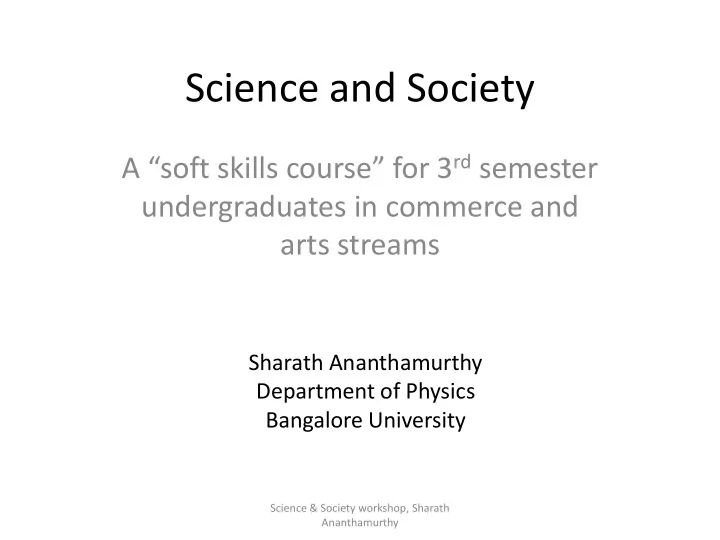

Science and Society A “soft skills course” for 3 rd semester undergraduates in commerce and arts streams Sharath Ananthamurthy Department of Physics Bangalore University Science & Society workshop, Sharath Ananthamurthy
Scope and methodology 1. Aim of the course • Whom is it intended for? • How can it be taught? • What are the learning outcomes? 2. Structure of the course • Suggested lecture topics • Emphasis 3. Readings, Preparation, Examination Science & Society workshop, Sharath Ananthamurthy
Aim of the course • To enable an educated view of the S&T enterprise, with basic knowledge of some of the key aspects of S&T without specializing in science • To develop an ability for a critical analysis of S&T and to be able to interpret its interaction with society • The course is not a “popular science” course • Although in the sections some basic facts are given, the emphasis should be on interpretations and analysis with reference to society Science & Society workshop, Sharath Ananthamurthy
Teaching • Mainly a person qualified in a postgraduate discipline of science (coordinates and delivers most of the lectures) The course coordinator may arrange other lectures The course coordinator may arrange other lectures by invited experts/ teachers from other disciplines by invited experts/ teachers from other disciplines
Learning outcomes • Be able to have a basic understanding of what science is (and is not) • Be able to appreciate and critically evaluate the S&T impact on our lives • Be able to have an “educated guess” about the future course of technological evolutions • Participate in the democratic process as educated citizens Science & Society workshop, Sharath Ananthamurthy
Structure Science & Society workshop, Sharath Ananthamurthy
What is Science? (6 lectures) Heliocentrism, Galileo and observational science, Renaissance period in europe Cartesian dualism (mind body separation) Reductionism Age of enlightenment Universe as a “mechanism” Science, mathematics in ancient India Modern notion of science Industrial revolution Science & Society workshop, Sharath Ananthamurthy
Copernicus Galileo Kepler (Heliocentric system) The birth of modern astronomy Galileo- Experimental observations as the basis for science Science & Society workshop, Sharath Ananthamurthy
The Renaissance and its significance • Leonardo Da Vinci • Galileo • Flowering of Art and Science Science & Society workshop, Sharath Ananthamurthy
Galilean refractor being displayed in Venice Science & Society workshop, Sharath Ananthamurthy
Rene Descartes 17 th Century Cartesian Dualism (in “Discourse on the Method”) -Separation of mind and matter Possible to know about the world through deductive reasoning alone. Separation of the divine, in this process Analytical Geometry developed by him Science & Society workshop, Sharath Ananthamurthy
Reductionism Descarte’s proposal that for any matter living or non living ( except humans) one could study the system as if it is composed of different working mechanical parts. Mechanistic View of Nature Conceiving the universe as a giant “clockwork mechanism” Science & Society workshop, Sharath Ananthamurthy
Other periods in history important for science Importance of reason, analysis over traditional figures of authority Science & Society workshop, Sharath Ananthamurthy
What is Science? What is Science? – Verifiability OR Falsifiability Verifiability OR Falsifiability • Positivist view of scientific method- Verifiability is an important criterion • Karl Popper- Not verifiability but rather falsifiable statements useful in science • Example- Assertion that “all crows are black” is in practice non verifiable since we can never be sure that we have looked at the complete set of crows that exist or will exist • On the other hand even one counter example of a non black crow can make the above statement false • Also tautologies such as “ A crow is a bird that is black” has no value Science & Society workshop, Sharath Ananthamurthy
What is Science? (Accepted view of a scientific method) What is Science? (Accepted view of a scientific method) Systematic Inquiry Objective Search Repeatable measurements/ Tests Hypothesis Modeling Theory/ Framework of a Consistency? (With other theory scientifically established results) Science & Society workshop, Sharath Ananthamurthy
Science in non-western cultures • Mathematics/Astronomy in ancient India • Vyakarana- Panini • Medicine/ Surgery ( Charaka, Sushruta) • Metallurgy ( Damascus steel, Iron smelting, coins) • Hindu/Arabic numerals Science & Society workshop, Sharath Ananthamurthy
How S&T are interdependent (3 lectures) • Laser as an example of a tool that has driven many scientific applications Science & Society workshop, Sharath Ananthamurthy
How S&T are interdependent • Microscopy and applications (1 lecture) • Germ theory of disease, Vaccinations ( Contributions of Robert Koch, Edward Jenner, Louis Pasteur) (1 lecture) Science & Society workshop, Sharath Ananthamurthy
Science and the public (1 or 2 lectures) • Discussion on science education • Spending on Science and Technology • Public audit of S&T- enabling this • Science and Technology in Indian environment Science & Society workshop, Sharath Ananthamurthy
Unit II: Examples Evolution of species Antibiotics Soaps, Chemicals, Plastics Atomic energy, Nuclear power plants, Fission Space exploration, Remote Sensing (India) Genetics and human health Nanomaterials, Smart materials Science & Society workshop, Sharath Ananthamurthy
Unit III: S&T-social impact • Green revolution • White revolution • IT revolution and connection with India • Renewable sources of Energy; Impact on environment • Climate change • High technology and impact on human psyche Science & Society workshop, Sharath Ananthamurthy
Recommend
More recommend